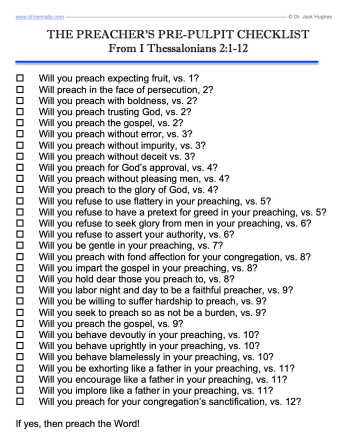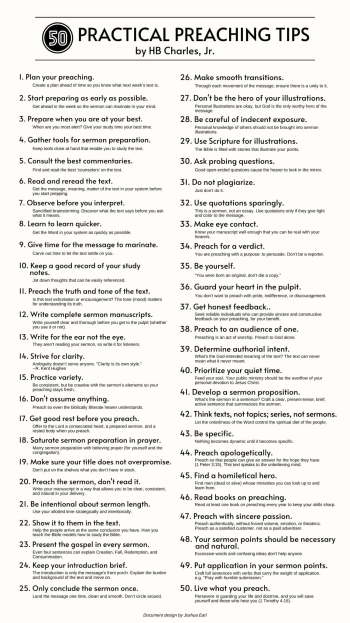“1. Clarity. …
2. Brevity. …
3. Intentionality. …
4. Repeatability. …
5. Posterity. …”
(Pastor Brad Whitt, Abilene Baptist Church, Augusta, Georgia)
 x.com
x.com
All good reasons. I didn’t manuscript my sermons, except for those which I delivered in the two classes on preaching which I was required to take in college.
Why didn’t I manuscript my sermons after graduation? I was a dialogue preacher. My sermons were planned beforehand but dialogue preaching allows for listeners to interrupt, ask questions and make observations. I preferred this style of preaching because it allowed me to meet the congregation where they were, not necessarily where I thought they were. Dialogue preaching keeps everyone involved; it isn’t the preacher delivering a lecture to congregation.
Today’s sermon title (example): “God is in the storm”
Sermon begins, I’m preaching in Exodus. Five minutes in someone in the congregation might ask about the storm on the Sea of Galilee where the Apostles were afraid and Jesus was asleep in the boat. I address the question from the pulpit, a member, perhaps several members of the congregation comment on my response, or perhaps add to it. I manage the conversation and return to preaching from Exodus. Someone in the congregation politely interrupts to offer an observation about the subject - perhaps disagreeing with something I said about it. We talk through it. I resume preaching in Exodus. A question is asked by a member of the congregation about exodus parallels in the New Testament. I hadn’t planned beforehand on addressing it in my sermon but I do now. And so it goes.
Time for the sermon ends. If the sermon wasn’t completed, I return to it the following week. Unless I’m led to address something more pressing. I work through books of the Bible one chapter at a time until the book is completed. Preaching on the book of Exodus (or any other book) might take me to many other books of the Bible during the sermon.
Every now and again, something would come up during a sermon that deserved more time than I had to give it. If it was serious enough, the following week I might not get back to Exodus (or whatever book I was preaching through) at all. I might spend the entire sermon time addressing in greater detail whatever the topic was that was brought up.
My college professors hated dialogue preaching. My congregations loved dialogue preaching. I was in the pulpit to serve my congregation, not my college professors.
Dialogue preaching has advantages and disadvantages, just as monologue preaching does.
There are few who practice dialogue preaching. It is generally looked down upon by monologue preachers as reducing the control of the preacher over the congregation. A certain amount of control is necessary in preaching but absolute control is not.
If you want to be a monologue preacher, then be a monologue preacher. It’s easier than being a dialogue preacher. No questions allowed during the sermon.
If you want to be a dialogue preacher, then be a dialogue preacher. It’s harder but more engaging than being a monologue preacher. Questions allowed during the sermon and encouraged.
Congregation members: Would you rather be “in the game” or just listening to it?
2. Brevity. …
3. Intentionality. …
4. Repeatability. …
5. Posterity. …”
(Pastor Brad Whitt, Abilene Baptist Church, Augusta, Georgia)
x.com
All good reasons. I didn’t manuscript my sermons, except for those which I delivered in the two classes on preaching which I was required to take in college.
Why didn’t I manuscript my sermons after graduation? I was a dialogue preacher. My sermons were planned beforehand but dialogue preaching allows for listeners to interrupt, ask questions and make observations. I preferred this style of preaching because it allowed me to meet the congregation where they were, not necessarily where I thought they were. Dialogue preaching keeps everyone involved; it isn’t the preacher delivering a lecture to congregation.
Today’s sermon title (example): “God is in the storm”
Sermon begins, I’m preaching in Exodus. Five minutes in someone in the congregation might ask about the storm on the Sea of Galilee where the Apostles were afraid and Jesus was asleep in the boat. I address the question from the pulpit, a member, perhaps several members of the congregation comment on my response, or perhaps add to it. I manage the conversation and return to preaching from Exodus. Someone in the congregation politely interrupts to offer an observation about the subject - perhaps disagreeing with something I said about it. We talk through it. I resume preaching in Exodus. A question is asked by a member of the congregation about exodus parallels in the New Testament. I hadn’t planned beforehand on addressing it in my sermon but I do now. And so it goes.
Time for the sermon ends. If the sermon wasn’t completed, I return to it the following week. Unless I’m led to address something more pressing. I work through books of the Bible one chapter at a time until the book is completed. Preaching on the book of Exodus (or any other book) might take me to many other books of the Bible during the sermon.
Every now and again, something would come up during a sermon that deserved more time than I had to give it. If it was serious enough, the following week I might not get back to Exodus (or whatever book I was preaching through) at all. I might spend the entire sermon time addressing in greater detail whatever the topic was that was brought up.
My college professors hated dialogue preaching. My congregations loved dialogue preaching. I was in the pulpit to serve my congregation, not my college professors.
Dialogue preaching has advantages and disadvantages, just as monologue preaching does.
There are few who practice dialogue preaching. It is generally looked down upon by monologue preachers as reducing the control of the preacher over the congregation. A certain amount of control is necessary in preaching but absolute control is not.
If you want to be a monologue preacher, then be a monologue preacher. It’s easier than being a dialogue preacher. No questions allowed during the sermon.
If you want to be a dialogue preacher, then be a dialogue preacher. It’s harder but more engaging than being a monologue preacher. Questions allowed during the sermon and encouraged.
Congregation members: Would you rather be “in the game” or just listening to it?




